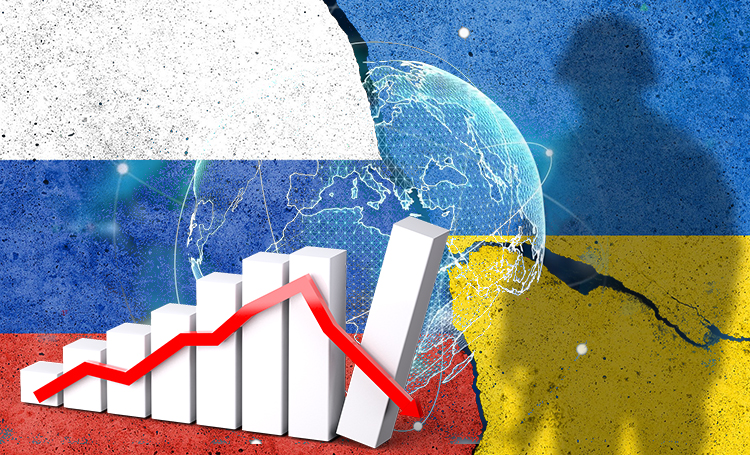How Ukraine-Russia War will Impact the Global Economy
 Dean Infotech Wednesday, April 20, 2022
Dean Infotech Wednesday, April 20, 2022

Russia’s invasion of Ukraine, which started on 24th February 2022, has resulted in a full-blown war. It is still too early to tell how to war’s repercussions will unfold, but the economic consequences are already being felt. It will affect the global economy through financial sanctions, commodities prices, and supply-chain disruptions. The world is already facing a large-scale supply shock on multiple fronts including supplies of fossil fuels, wheat potash, nitrogen fertilizers as well as industrial metals like nickel and titanium. The result is an upsurge in world prices for all these commodities.
Impact of Ukraine-Russia War on the Global Economy
Here's a look at Ukraine-Russia news where you can learn about how the global economy is impacted by the continuing Putin war on Ukraine:
1. Food Industry
UN Secretary-General Antonio Guterres has warned that the conflict can reverberate far beyond Ukraine. Russia and Ukraine being the breadbaskets of the world, they account together for 30% of global wheat exports. Hence, the prices of cereals and cooking oils have risen. The UN’s Food and Agriculture Organization says the number of undernourished people can increase by 8 to 13 million people over the year.
2. Supply Chain
The world’s unexpectedly robust recovery from the pandemic recession left the companies scrambling to find enough raw materials and components to produce goods meeting the surging customer demand. Overwhelmed factories, ports, and freight yards have meant shortages, shipping delays, and higher prices. The disruptions to Russian and Ukrainian industries can delay any return to the normal conditions.
3. Automobile Sector
The auto industry is expected to be hit hard by the war. The rise in oil prices, sustained scarcity of semiconductors and chips, and other rare earth metals are likely to add to the industry’s woes. In addition to it, Ukraine is also home to many companies that manufacture car components for automakers. According to a report in ‘The Wall Street Journal’, Leoni AG, a company that supplies wire systems made in Ukraine to European auto companies has shut its two factories in the country. Moreover, Volkswagen AG had to shut down one of its plants in Germany.
4. Transportation
Land-based trade routes between Asia and Europe will be disrupted as transit through Russia has become more difficult. This will affect some Chinese companies which have increased their traffic over land-based routes during the COVID-19 pandemic.
Air ties between Russia and Europe will be rigorously hindered following the decision of EU countries to close their airspace to Russian aircraft and cargo. About 35% of global freight was being transported by air before the pandemic.
Sea freight routes through the Black Sea will be canceled for months following Ukraine’s decision to shut down commercial shipping and Turkey’s decision to restrict transit through the Bosphorus. This will have an impact on grain shipment which transits through Ukrainian, Russian, and possibly Bulgarian and Romanian ports.
5. Stock Markets
The stock markets had started 2022 on a good note but the war has brought volatility to the markets. Moscow’s stock exchange was closed for three weeks. Western sanctions have paralyzed the Russian banking sector and financial system while the ruble has distorted. Russians now face the risk of defaulting on debt for the first time in decades. Moscow now has to pay interest on two dollar-denominated bonds providing the government some breathing room until the next debt payments.
6. Energy
Many European countries are heavily dependent on Russian energy, particularly gas through different important pipelines. Even if the conflict comes to an end, there will always be a possibility that the harsh economic sanctions on Russia would make it very difficult for different countries to be able to import gas. The oil prices have gushed as supply disruptions escalated following sanctions on Russian banks, while the traders have scrambled to seek alternative sources in the market.
The Bottom Line
The economic consequences will be felt across the world mainly through the rise in commodity prices, which will increase the already existing inflationary pressures. As always when the commodity prices will soar, net importers of energy and food products will be particularly affected, with the specter of major supply disruptions in the event of an even greater escalation of the conflict. The drop in demand from Europe will also hinder worldwide trade.
If we evaluate the Asia-Pacific region, the impact will be felt almost immediately through higher import prices, particularly in energy prices with many economies in the region being net energy importers, managed by China, Japan, India, South Korea, Taiwan, and Thailand.
In addition to it, as North American trade and financial links with Russia and Ukraine are fairly limited, the impact of the conflict will mainly be felt through the price channel and the slowdown of the European growth. Despite the outlook of slower economic growth and better inflation, the current geopolitical events are not expected to derail monetary policy in North America at this stage.






Comment